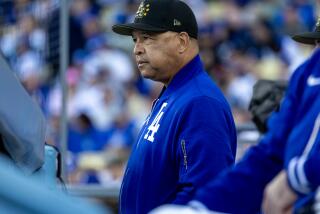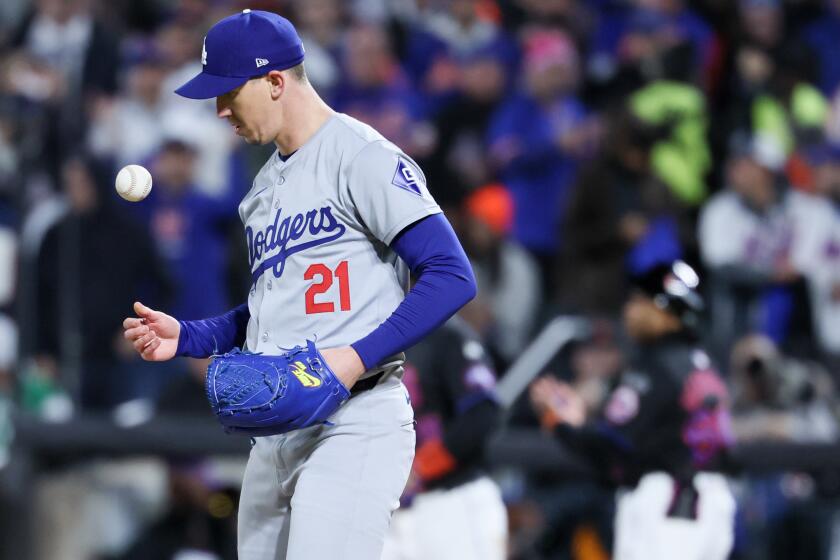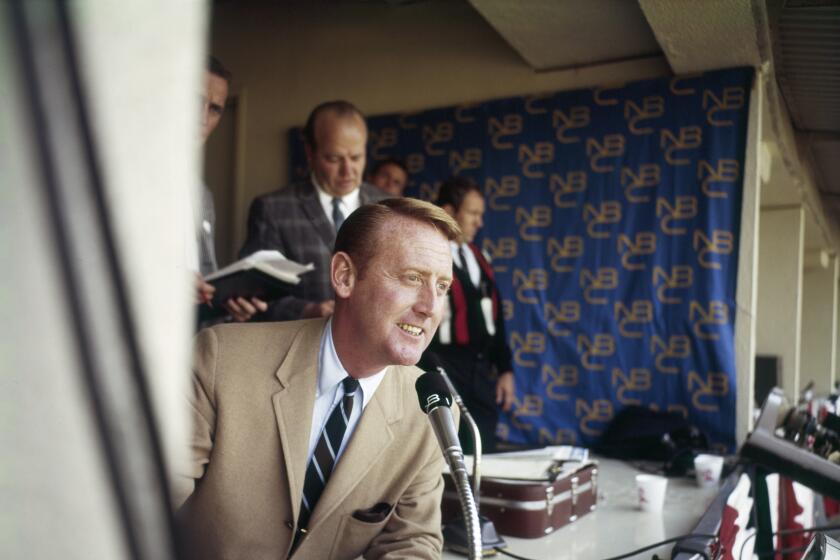Stewart’s Upset, Understandably
Contraction didn’t claim Dave Stewart on Wednesday.
The highly regarded Stewart was victimized by his sport’s equally ill-conceived process of minority hiring for the front office.
Hopeful at one point to be a minority pioneer in putting his imprint on a major league team as general manager, Stewart reacted to the appointment of J.P. Ricciardi as general manager of the Toronto Blue Jays by quitting as the team’s assistant GM and insisting he would no longer be among the token interviews for teams that are merely trying to satisfy Commissioner Bud Selig’s quota of minority applicants.
In a phone interview from Toronto, Stewart called the thinking among owners “shallow, narrow and ignorant” and said, “If it’s their preference that we fill roles only on the field as managers and coaches, they should say that. I mean, it wouldn’t be any easier to accept, but it would at least honestly represent what’s going on and we could live with that. As it is, we’re simply filling Bud Selig’s quota, and I don’t intend to do that anymore. I mean, for me, the system doesn’t work. It’s pitiful, and the good thing is, I don’t have to play it anymore.”
Stewart, the four-time 20-game winner with the Oakland Athletics, will return to the field in 2002 as pitching coach of the Milwaukee Brewers, working for Davey Lopes, who is one of five minority field managers. The others are Dusty Baker of the San Francisco Giants, Don Baylor of the Chicago Cubs, Jerry Manuel of the Chicago White Sox and Lloyd McClendon of the Pittsburgh Pirates.
The only minority general manager is Kenny Williams of the White Sox.
The Blue Jays, Dodgers and Texas Rangers had a chance to correct that situation this winter but took a familiar course. The Dodgers--the organization of Jackie Robinson and Al Campanis--didn’t even interview a minority candidate before elevating Dan Evans as general manager, skirting Selig’s interviewing requirement on the basis that Evans was already in the organization and basically filling the GM role already. Think blue? Evans has since made some solid front office appointments, hiring John Boles, Bill Bavasi and Joe Amalfitano, but the baseball wing of the Dodger front office operation remains entirely white, as does the baseball wings of most major league teams.
An industry study last year showed 23% of front office roles filled by minorities, up from 21% in 1997 and 18% in 1995, but those include secretarial positions, as well as business and marketing positions. Williams, an African American, is only the fourth minority, following Bob Watson, Frank Robinson and Bill Lucas, to serve as a general manager.
“I have said repeatedly that we need to do a better job of minority hiring in the decision making roles,” Selig said Wednesday. “The talent pool is there, and we need to do a better job of employing it. It’s one of the important topics that I continue to discuss with the owners.”
No one seems to be listening.
In Toronto, Stewart was the only minority among six people who interviewed to succeed the fired Gord Ash as general manager. In addition to Ricciardi, the others were former Texas GM Doug Melvin, former Arizona manager Buck Showalter, current Philadelphia assistant GM Mike Arbuckle and current Toronto assistant Tim McCleary.
Ricciardi, 42, has spent 21 years in baseball as player, coach and scout, 15 with the A’s, but in Stewart’s view he has never worked with contracts and budgets and never run a department and “so when it comes to credibility, this just doesn’t fly. I mean, J.P. is a good man and this is hard for me to say, but he’s obviously not more qualified than I am. The only way I can look at it is that the Blue Jays decided anyone would be better than Stew. The only way I can look at is that guys like me have to prove themselves over and over. At some point you just don’t want to knock on those doors anymore.”
The decision was made by Toronto chairman Paul Godfrey, the same man who had offered Stewart the team’s managerial reins before Buck Martinez came out of the broadcasting booth to become the manager last year when Stewart decided to remain in the front office, serving several key roles under Ash.
“If he thought enough of me to offer me the chance to manage before Buck, why wouldn’t he offer me the chance to become general manager?” Stewart said. “I love this city and will continue to work with my charities here, but I’m through with sports in Toronto. I’ve made some bad decisions in my life, but I didn’t know coming back here was going to be one of them.”
Stewart, who pitched for the Blue Jays in 1993 and ‘94, helping the ’93 team win the World Series, spent three years in the Toronto front office after serving as the San Diego Padres’ assistant GM for two years and pitching coach in 1998, when the Padres won the National League pennant. Snubbed consistently and inexplicably by the Dodgers, his original team, Stewart’s only other GM interview came two years ago with the Brewers, who ultimately replaced Sal Bando with Atlanta assistant Dean Taylor.
“I thought I interviewed well, and Wendy [Selig-Prieb, the club president] acknowledged that I did,” Stewart said, “but at that time they wanted to go from a baseball man [Bando] to a person more experienced from an organizational standpoint, and I thought that was legitimate. I used the two years to improve my skills in that area, as well as every other. Last year was about J.P.’s first in the front office. I don’t even know how it came down to a decision. I mean, I could have understood it if they had chosen a guy with Doug Melvin’s experience and credentials, but not the way it played out. It’s frustrating.
“I know other minorities may have been looking up to me to make things better for them, but I’ve lost hope in the direction baseball is going with minorities. I’m not shutting the door to becoming a general manager, but I won’t interview. A club will have to come to me with an offer, that’s the only way.”
The intensity and intelligence that Stewart displayed on the mound have characterized his demeanor off it, but if clubs have been wary of his tendency to say anything on his mind, seldom holding back, some of his comments in response to the Blue Jays’ decision may serve to exacerbate that feeling and make it even more difficult for him to receive a GM offer.
“Look,” he said, “I don’t need to be a general manager. I’ve done well financially. I have a good life. But if I didn’t say anything, if I didn’t describe the situation as it exists, if I didn’t say that the owners needed to open their minds and quit being so ignorant and short-sighted, then I would be doing a disservice to guys like Dave Wilder and Doc Rogers and Omar Minaya and Muzzy Jackson, guys who deserve a chance in the same way that I felt I did.
“Worry about the reaction?
“I already know what the thinking is.”
The Blue Jays merely made it official.
More to Read
Are you a true-blue fan?
Get our Dodgers Dugout newsletter for insights, news and much more.
You may occasionally receive promotional content from the Los Angeles Times.









